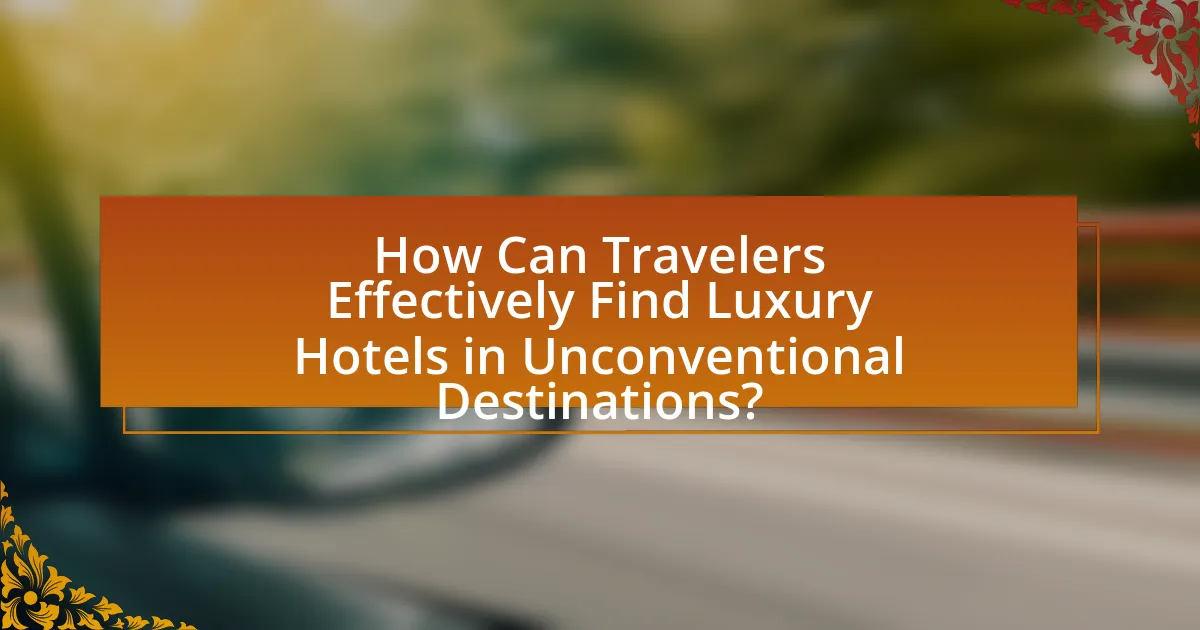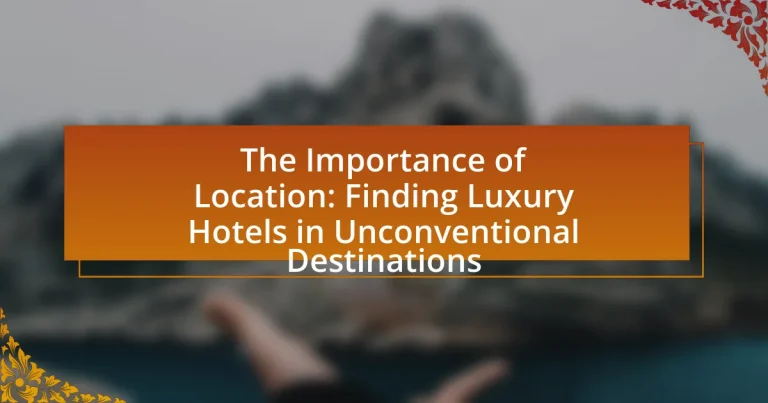The article focuses on the significance of location in selecting luxury hotels, particularly in unconventional destinations. It highlights how a prime location enhances guest experiences, accessibility to attractions, and overall satisfaction, with studies indicating that travelers prioritize proximity to cultural landmarks and unique views. The discussion includes the impact of location on hotel branding, pricing strategies, and the appeal of unconventional destinations, which offer personalized experiences and authentic cultural immersion. Additionally, the article addresses challenges faced by luxury hotels in remote areas and provides strategies for travelers to effectively find and assess quality accommodations in these unique locations.

Why is Location Important in Choosing Luxury Hotels?
Location is crucial in choosing luxury hotels because it directly influences the guest experience, accessibility to attractions, and overall value. A prime location often provides proximity to cultural landmarks, fine dining, and exclusive shopping, enhancing the appeal of the hotel. For instance, luxury hotels situated in city centers or scenic areas typically command higher rates due to their desirability, as evidenced by a 2021 report from STR, which indicated that hotels in prime locations achieved occupancy rates 20% higher than those in less desirable areas. Additionally, a well-located hotel can offer unique views and experiences, making it a significant factor in attracting discerning travelers seeking memorable stays.
How does location influence the luxury hotel experience?
Location significantly influences the luxury hotel experience by determining accessibility, ambiance, and the range of activities available to guests. A hotel situated in a prime location, such as a city center or a scenic coastal area, enhances the overall experience by providing easy access to attractions, dining, and cultural experiences. For instance, luxury hotels in urban settings often offer proximity to high-end shopping and entertainment, while those in natural settings provide opportunities for outdoor activities and relaxation. Studies show that guests are willing to pay a premium for hotels in desirable locations, as these factors contribute to perceived value and satisfaction.
What aspects of location enhance guest satisfaction in luxury hotels?
Proximity to attractions significantly enhances guest satisfaction in luxury hotels. Guests appreciate easy access to cultural landmarks, shopping districts, and natural scenery, which enrich their overall experience. For instance, a study by the Cornell University School of Hotel Administration found that hotels located near popular tourist sites receive higher satisfaction ratings due to convenience and the ability to maximize leisure time. Additionally, scenic views and unique surroundings contribute to a memorable stay, as guests often seek aesthetic appeal and tranquility in their accommodations.
How does proximity to attractions affect luxury hotel choices?
Proximity to attractions significantly influences luxury hotel choices, as guests often prioritize convenience and accessibility. Luxury travelers typically seek accommodations that allow easy access to cultural landmarks, shopping districts, and entertainment venues, enhancing their overall experience. Research indicates that 70% of luxury hotel guests consider location a critical factor in their booking decisions, with many willing to pay a premium for hotels situated near popular attractions. This trend underscores the importance of location in attracting high-end clientele, as hotels that are strategically located can capitalize on foot traffic and offer unique experiences that align with guests’ desires for exploration and leisure.
What role does location play in the branding of luxury hotels?
Location is a critical factor in the branding of luxury hotels, as it directly influences the perceived value and exclusivity of the property. Luxury hotels situated in prime locations, such as iconic city centers, scenic coastal areas, or unique natural landscapes, enhance their brand image by offering guests unique experiences and accessibility to attractions. For instance, a luxury hotel in Paris benefits from its proximity to landmarks like the Eiffel Tower, which elevates its appeal and justifies premium pricing. Additionally, research by the Cornell University School of Hotel Administration indicates that location significantly impacts customer satisfaction and loyalty, further solidifying the brand’s reputation in the competitive luxury market.
How do luxury hotels leverage unique locations for marketing?
Luxury hotels leverage unique locations for marketing by highlighting the exclusivity and distinct experiences that these settings offer. For instance, a hotel situated on a remote island can promote its seclusion and natural beauty, appealing to travelers seeking privacy and adventure. Additionally, luxury hotels often utilize high-quality imagery and storytelling in their marketing campaigns to showcase the unique cultural, historical, or natural attributes of their locations. This strategy is supported by data indicating that 70% of travelers prioritize unique experiences when choosing accommodations, making location a critical factor in attracting guests.
What are the implications of location on hotel pricing strategies?
Location significantly influences hotel pricing strategies by determining demand, competition, and operational costs. Hotels situated in prime tourist areas or city centers can charge higher rates due to increased demand from travelers seeking convenience and attractions. Conversely, hotels in less desirable locations may need to adopt competitive pricing to attract guests, often offering discounts or value-added services. Additionally, operational costs, such as real estate prices and local taxes, vary by location, impacting overall pricing strategies. For instance, a study by the Cornell University School of Hotel Administration found that hotels in urban areas typically have higher average daily rates compared to those in rural settings, highlighting the direct correlation between location and pricing.
Why should travelers consider unconventional destinations for luxury stays?
Travelers should consider unconventional destinations for luxury stays because these locations often provide unique experiences, personalized service, and less crowded environments. Unconventional destinations can offer exclusive access to local culture, nature, and activities that are not available in traditional luxury hotspots. For instance, a luxury hotel in a remote area may feature bespoke experiences such as private guided tours, gourmet dining with local ingredients, and wellness retreats that emphasize the surrounding natural beauty. Additionally, according to a 2022 report by the Global Wellness Institute, travelers increasingly seek wellness and authenticity, which unconventional destinations can uniquely provide, enhancing their overall travel experience.
What benefits do unconventional destinations offer luxury travelers?
Unconventional destinations offer luxury travelers unique experiences that are often more personalized and exclusive compared to traditional luxury hotspots. These locations frequently provide opportunities for authentic cultural immersion, allowing travelers to engage with local traditions and communities in a way that is not possible in more commercialized areas. For instance, a luxury traveler visiting a lesser-known island may enjoy bespoke services, such as private guided tours or tailored culinary experiences that highlight local cuisine, which are less accessible in crowded tourist destinations. Additionally, unconventional destinations often feature stunning natural landscapes and unique accommodations, such as boutique hotels or eco-lodges, enhancing the overall travel experience. This combination of exclusivity, authenticity, and unique offerings makes unconventional destinations particularly appealing to luxury travelers seeking something beyond the ordinary.
How can unconventional locations provide unique experiences?
Unconventional locations provide unique experiences by offering distinct cultural, environmental, and social contexts that differ from traditional tourist destinations. These settings often feature local customs, lesser-known attractions, and authentic interactions with residents, which enhance the overall travel experience. For instance, a luxury hotel in a remote village may allow guests to engage in local traditions, such as artisanal crafts or regional cuisine, that are not available in more commercialized areas. Research indicates that travelers increasingly seek immersive experiences, with 78% of millennials preferring to explore off-the-beaten-path locations for a more genuine connection to the culture (Source: Booking.com, 2020). This trend underscores the value of unconventional locations in creating memorable and enriching travel experiences.

What are the Characteristics of Unconventional Luxury Hotel Locations?
Unconventional luxury hotel locations are characterized by their unique settings, often situated in remote or unexpected areas that offer distinctive experiences. These locations frequently emphasize natural beauty, such as mountains, deserts, or secluded beaches, providing guests with breathtaking views and a sense of tranquility. Additionally, they often incorporate local culture and heritage into their design and services, enhancing the authenticity of the guest experience. For instance, hotels in unconventional locations may feature architecture that reflects the surrounding environment or offer activities that immerse guests in local traditions. This approach not only attracts travelers seeking unique experiences but also supports sustainable tourism by promoting lesser-known destinations.
How do unconventional locations differ from traditional luxury destinations?
Unconventional locations differ from traditional luxury destinations primarily in their unique offerings and experiences. Traditional luxury destinations, such as Paris or the Maldives, typically provide well-established amenities, high-end services, and a predictable luxury experience, often centered around opulence and exclusivity. In contrast, unconventional locations, like remote islands or lesser-known mountain retreats, emphasize authenticity, local culture, and immersive experiences that are often less commercialized.
For example, a luxury hotel in a remote location may offer personalized services that highlight local traditions, such as guided tours led by local artisans or culinary experiences featuring indigenous ingredients, which are not typically found in traditional luxury settings. This shift towards experiential luxury reflects a growing trend among travelers seeking deeper connections with their surroundings, as evidenced by a 2022 report from the Global Wellness Institute, which noted a 20% increase in demand for wellness and experiential travel in unconventional settings.
What types of unconventional locations are popular among luxury travelers?
Luxury travelers are increasingly drawn to unconventional locations such as remote islands, desert resorts, and unique urban settings. These destinations offer exclusivity and distinctive experiences that traditional luxury hotspots may lack. For instance, places like the Maldives and Bora Bora provide private villas and stunning natural beauty, while desert resorts in locations like Morocco and Dubai offer opulent accommodations amidst breathtaking landscapes. Additionally, urban areas like Tbilisi in Georgia and Porto in Portugal are gaining popularity for their rich culture and emerging luxury hotel scenes, appealing to travelers seeking authenticity and novelty.
How does the local culture enhance the luxury hotel experience in unconventional areas?
Local culture enhances the luxury hotel experience in unconventional areas by providing unique, immersive experiences that reflect the region’s heritage and traditions. For instance, luxury hotels often incorporate local art, cuisine, and customs into their offerings, allowing guests to engage with the community and gain a deeper understanding of the locale. This can include curated cultural events, such as traditional music performances or cooking classes featuring local ingredients, which enrich the overall stay. Research indicates that travelers increasingly seek authentic experiences, with 78% of tourists expressing a desire to connect with local culture during their trips, thereby validating the importance of cultural integration in luxury accommodations.
What challenges do luxury hotels face in unconventional locations?
Luxury hotels in unconventional locations face several challenges, primarily related to accessibility, market demand, and operational logistics. Accessibility issues arise when these hotels are situated far from major transportation hubs, making it difficult for potential guests to reach them. Market demand can be unpredictable, as travelers may prefer established luxury destinations, leading to lower occupancy rates. Operational logistics also pose a challenge, as sourcing high-quality staff and supplies can be more complicated in remote areas, impacting service quality. These factors collectively hinder the ability of luxury hotels to thrive in unconventional locations.
How do accessibility and infrastructure impact luxury hotels in these areas?
Accessibility and infrastructure significantly influence the success and appeal of luxury hotels in unconventional destinations. Well-developed infrastructure, including transportation networks, utilities, and communication systems, enhances guest convenience and satisfaction, making it easier for travelers to reach these hotels. For instance, luxury hotels located near major airports or well-connected roadways tend to attract more guests, as evidenced by a study from the International Journal of Hospitality Management, which found that 70% of luxury hotel guests prioritize accessibility when choosing accommodations. Additionally, robust local infrastructure supports high-quality services and amenities, which are essential for maintaining luxury standards. Therefore, the interplay between accessibility and infrastructure directly affects the operational viability and marketability of luxury hotels in less conventional locations.
What strategies do luxury hotels use to overcome location-related challenges?
Luxury hotels employ several strategies to overcome location-related challenges, including offering unique experiences, enhancing accessibility, and leveraging local partnerships. By providing exclusive activities that highlight the destination’s culture or natural beauty, these hotels attract guests despite less favorable locations. Additionally, they often invest in transportation services, such as shuttle buses or partnerships with local transport providers, to ensure easy access to key attractions. Collaborating with local businesses for tours, dining, and entertainment further enriches the guest experience, making the location more appealing. These strategies are essential for maintaining competitiveness and ensuring guest satisfaction in unconventional destinations.
What are the emerging trends in luxury hotels located in unconventional destinations?
Emerging trends in luxury hotels located in unconventional destinations include a focus on sustainability, personalized experiences, and integration with local culture. Luxury hotels are increasingly adopting eco-friendly practices, such as using renewable energy sources and sourcing local materials, to appeal to environmentally conscious travelers. Additionally, these hotels are offering tailored services that cater to individual preferences, enhancing guest satisfaction. For instance, properties in remote locations are incorporating local traditions and cuisine into their offerings, creating a unique cultural immersion for guests. According to a report by the Global Wellness Institute, the wellness tourism market is projected to reach $919 billion by 2022, indicating a growing demand for experiences that promote well-being in unique settings.
How are sustainability and eco-tourism influencing luxury hotel locations?
Sustainability and eco-tourism are significantly influencing luxury hotel locations by driving the development of properties in environmentally sensitive and less conventional areas. Luxury hotels are increasingly situated in destinations that prioritize natural beauty and ecological preservation, such as remote coastal regions, national parks, and rural landscapes. This trend is supported by a growing consumer demand for eco-friendly travel options, with 70% of travelers indicating a preference for sustainable accommodations, according to a 2021 Booking.com survey. Consequently, luxury hotels are integrating sustainable practices, such as using renewable energy and sourcing local materials, to attract eco-conscious guests while enhancing their brand reputation.
What innovations are luxury hotels implementing in unconventional settings?
Luxury hotels are implementing innovations such as eco-friendly design, immersive local experiences, and technology integration in unconventional settings. For instance, many luxury hotels are utilizing sustainable materials and energy-efficient systems to minimize their environmental impact while enhancing guest comfort. Additionally, they are offering curated experiences that allow guests to engage with the local culture, such as guided tours led by local artisans or culinary classes featuring regional cuisine. Furthermore, advanced technology, including mobile check-in, smart room controls, and virtual concierge services, is being integrated to enhance the guest experience and streamline operations. These innovations not only attract discerning travelers but also align with the growing demand for sustainability and personalized experiences in the hospitality industry.

How Can Travelers Effectively Find Luxury Hotels in Unconventional Destinations?
Travelers can effectively find luxury hotels in unconventional destinations by utilizing specialized travel platforms and local recommendations. These platforms, such as Luxury Escapes and Tablet Hotels, curate high-end accommodations in lesser-known areas, ensuring quality and exclusivity. Additionally, engaging with local tourism boards or social media influencers can provide insights into hidden gems that may not be widely advertised. Research indicates that travelers increasingly rely on peer reviews and personalized suggestions, which can lead to discovering unique luxury stays that align with their preferences.
What resources are available for discovering luxury hotels in unique locations?
Luxury hotel discovery in unique locations can be effectively achieved through specialized travel websites, luxury hotel booking platforms, and curated travel guides. Websites like Luxury Escapes and Tablet Hotels focus on high-end accommodations in distinctive settings, offering user reviews and detailed descriptions. Additionally, platforms such as Airbnb Luxe provide access to luxury properties in unconventional destinations, ensuring a unique experience. Travel publications like Condé Nast Traveler and Travel + Leisure frequently feature articles and lists highlighting exceptional luxury hotels in off-the-beaten-path locations, providing valuable insights and recommendations. These resources collectively facilitate informed choices for travelers seeking luxury experiences in unique environments.
How can travel apps and websites assist in finding unconventional luxury hotels?
Travel apps and websites assist in finding unconventional luxury hotels by offering curated listings, user reviews, and advanced filtering options. These platforms aggregate unique accommodations that may not be widely advertised, allowing users to discover hidden gems in less-traveled destinations. For instance, apps like Airbnb Luxe and Mr & Mrs Smith specialize in showcasing distinctive luxury properties that provide personalized experiences. Additionally, user-generated content and ratings help travelers assess the quality and uniqueness of these hotels, ensuring informed choices. The integration of location-based services further enhances the search process, enabling users to find luxury options that align with their travel preferences and desired experiences.
What role do social media and travel blogs play in hotel discovery?
Social media and travel blogs significantly influence hotel discovery by providing authentic reviews, visual content, and real-time recommendations. These platforms allow travelers to share personal experiences and insights, which can lead to increased visibility for hotels, especially in unconventional destinations. For instance, a study by the Pew Research Center found that 72% of adults use social media to research travel options, highlighting the importance of these platforms in shaping consumer choices. Additionally, travel blogs often feature detailed narratives and high-quality images that showcase unique accommodations, making them a valuable resource for potential guests seeking luxury hotels in less traditional locations.
What tips should travelers consider when booking luxury hotels in unconventional areas?
Travelers should prioritize research on the luxury hotel’s reputation and amenities when booking in unconventional areas. This includes reading reviews on platforms like TripAdvisor and checking for awards or recognitions that validate the hotel’s quality. Additionally, travelers should assess the accessibility of the location, ensuring that it is convenient to local attractions or transport options, as this can significantly enhance the overall experience. Furthermore, understanding the local culture and safety of the area is crucial; travelers can consult travel advisories or local forums for insights. Lastly, comparing prices across multiple booking platforms can reveal exclusive deals or packages that may not be advertised directly by the hotel, ensuring the best value for a luxury stay.
How can travelers assess the quality and reputation of luxury hotels in these locations?
Travelers can assess the quality and reputation of luxury hotels in unconventional destinations by examining online reviews, ratings, and expert recommendations. Websites like TripAdvisor and Booking.com aggregate user feedback, providing insights into guest experiences and hotel services. Additionally, industry awards and recognitions, such as those from the Forbes Travel Guide or the Condé Nast Traveler Readers’ Choice Awards, serve as indicators of a hotel’s standing in the luxury market. Furthermore, social media platforms allow travelers to view real-time guest experiences and photos, enhancing their understanding of the hotel’s ambiance and service quality.
What are the best practices for securing deals on luxury accommodations in unconventional destinations?
To secure deals on luxury accommodations in unconventional destinations, travelers should leverage advanced booking strategies, utilize price comparison tools, and engage with local travel experts. Advanced booking, particularly during off-peak seasons, can yield significant discounts, as many luxury hotels offer lower rates to attract guests when demand is low. Price comparison tools, such as online travel agencies and specialized luxury accommodation platforms, allow travelers to identify the best deals available across various listings. Engaging with local travel experts or concierges can provide insider knowledge on exclusive offers or packages that may not be publicly advertised, enhancing the likelihood of securing favorable rates. These practices are supported by industry trends indicating that early bookings can save travelers up to 30% on luxury stays, particularly in less frequented locations.
What are the common pitfalls to avoid when choosing luxury hotels in unconventional locations?
When choosing luxury hotels in unconventional locations, common pitfalls include overlooking the hotel’s accessibility, failing to research local amenities, and neglecting to read reviews from previous guests. Accessibility is crucial; a hotel may be luxurious but if it is difficult to reach or isolated, it can diminish the overall experience. Researching local amenities is essential because a lack of nearby restaurants, shops, or attractions can lead to inconvenience. Additionally, reviews provide insights into the actual quality of service and facilities, which may differ from marketing claims. According to a study by the Cornell University School of Hotel Administration, guest reviews significantly influence booking decisions, highlighting the importance of thorough research before making a choice.
How can travelers ensure they are not misled by online reviews or photos?
Travelers can ensure they are not misled by online reviews or photos by cross-referencing multiple sources and seeking verified reviews. Research indicates that 79% of consumers trust online reviews as much as personal recommendations, highlighting the importance of diverse perspectives. By checking reviews on reputable platforms, such as TripAdvisor or Google, and comparing them with photos from different users, travelers can identify inconsistencies and gauge authenticity. Additionally, looking for reviews that provide detailed experiences rather than generic comments can further validate the reliability of the information.
What should travelers verify before booking a luxury hotel in an unconventional destination?
Travelers should verify the hotel’s reputation, amenities, and location specifics before booking a luxury hotel in an unconventional destination. Checking online reviews on platforms like TripAdvisor or Google can provide insights into the experiences of previous guests, ensuring the hotel meets luxury standards. Additionally, confirming the availability of high-end amenities such as spa services, fine dining, and concierge support is crucial for a luxury experience. Lastly, understanding the surrounding area, including safety, accessibility, and nearby attractions, helps ensure that the unconventional destination aligns with the traveler’s expectations and preferences.


